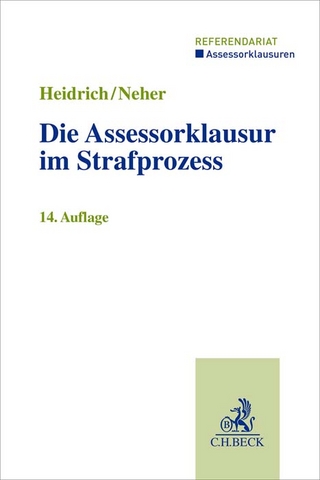
Indirect Criminalisation
Hart Publishing (Verlag)
978-1-5099-4143-8 (ISBN)
Since the late 20th century many Western jurisdictions introduced a range of civil preventive measures in order to prevent and deal with various types of criminality. Although the stated objective of these interventions is the prevention of crime, their implementation can result in the imposition of restrictions akin to criminal punishment leading to the indirect criminalisation of certain kinds of behaviour.
Through the adoption of an interdisciplinary approach which combines criminal law theory and empirical criminology, this book engages with the phenomenon of indirect criminalisation using the legal framework on anti-social behaviour in England and Wales as a case study.
It engages with central questions within legal theory:
- what are the normative challenges posed by indirect criminalisation and mechanisms for distinguishing criminal from non-criminal rules?
- how can such questions be tested and applied empirically?
- has the ASBO’s successor been operating as de facto criminal measure?
Stavros Demetriou is Lecturer in Law at the University of Sussex, UK.
1. Liberty, Security and the Civil/Criminal Law Divide
1.1. Introduction
1.2. Important Terminology
1.3. Civil Preventive Measures and the Liberal State
1.4. Anti-Social Behaviour in England and Wales
1.5. Scope of the Book
1.6. Methodology
1.7. Structure of the Book
2. The Problem with Indirect Criminalisation
2.1. Introduction
2.2. The Limits of the Liberal State
2.3. The Coercive and Educative Nature of Criminalisation
2.4. Further Reflections on Indirect Criminalisation and Punishment
2.5. Conclusion
3. Conceptualising Criminalisation
3.1. Introduction
3.2. Conceptualising Criminalisation: The Existing Approaches
3.3. Reconceptualising Criminalisation
3.4. Conclusion
4. A Theoretical Analysis of the Injunction
4.1. Introduction
4.2. Addressing Anti-Social Behaviour
4.3. A Form of Criminalisation?
4.4. Conclusion
5. A Qualitative Analysis of the 2014 Amendments
5.1. Introduction
5.2. The Scope of this Study
5.3. Conceptualising Anti-Social Behaviour at a Local Level
5.4. The 2014 Amendments
5.5. Conclusion
6. Implementing Anti-Social Behaviour Policies in Practice: An Empirical Evaluation of the ASBO’s Successor
6.1. Introduction
6.2. Procedure Followed after being Notified about a Potential Incident of Anti-Social Behaviour
6.3. Addressing Anti-Social Behaviour at a Local Level
6.4. A Form of Indirect Criminalisation?
6.5. Conclusion
7. Conclusion
An Overview of the Main Findings of this Study and their Implications
Concluding Remarks
| Erscheinungsdatum | 13.02.2023 |
|---|---|
| Verlagsort | Oxford |
| Sprache | englisch |
| Maße | 156 x 234 mm |
| Themenwelt | Recht / Steuern ► EU / Internationales Recht |
| Recht / Steuern ► Strafrecht ► Strafverfahrensrecht | |
| ISBN-10 | 1-5099-4143-6 / 1509941436 |
| ISBN-13 | 978-1-5099-4143-8 / 9781509941438 |
| Zustand | Neuware |
| Informationen gemäß Produktsicherheitsverordnung (GPSR) | |
| Haben Sie eine Frage zum Produkt? |
aus dem Bereich


